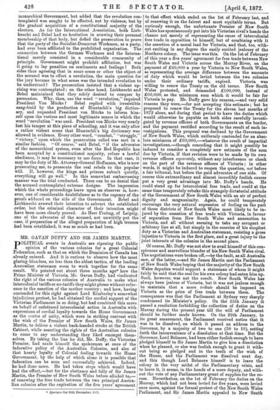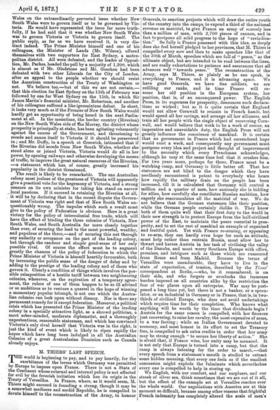MR. GAVAN PUFFY AND SIR JAMES MARTIN.
POLITICAL events in Australia are ripening the public opinion of the various colonies for a great Colonial Federation, such as that on which the Dominion of Canada has already entered. And it is curious to observe how the most glaring blunders, no less than the ablest tactics, of the leading Australian statesmen seem to work together for the same result. We pointed out about three months ago* how the Prime Minister of Victoria, Mr. Gavan Duffy, had vindicated the right of the various colonies of Australia to make what intercolonial tariffs or no-tariffs they might please without refer- ence to the sanction of the mother country ; and how, having contended for this right against Lord Kimberley's somewhat injudicious protest, he had obtained the cordial support of the Victorian Parliament in so doing, but had combined this move on behalf of unfettered intercolonial action in Australia with expressions of cordial loyalty towards the Home Government as the centre of unity, which were in striking contrast with the wish of the Premier of New South Wales, Sir James Martin, to deliver a violent back-handed stroke at the British Cabinet, while asserting the rights of the Australian colonies to come to any understanding they liked amongst them- .selves. By taking the line he did, Mr. Duffy, the Victorian Premier, had made himself the spokesman at once of the federative policy of the Australian Colonies, and also of that hearty loyalty of Colonial feeling towards the Home Government, by the help of which alone it is possible that federation can be soon and successfully achieved. Indeed, he had done more. He had taken steps which would have had the effect,—but for the obstinacy and folly of Sir James Martin, the Premier of New South Wales before alluded to,— of renewing the free trade between the two principal Austra- lian colonies after the expiration of the five years' agreement * Spectator for 30th December, lin.
to that effect which ended on the 1st of February last, and of renewing it on the fairest and most equitable terms. But curiously enough, the unfortunate Premier of New South Wales has spontaneously put into his Victorian rival's hands the chance not merely of representing the cause of intercolonial free trade in opposition to himself, but of combining with it the assertion of a moral lead for Victoria, and that, too, with- out exciting in any degree the easily excited jealousy of the Northern colony. The issue was this. On the 1st of February of this year a five years' agreement for free trade between New South Wales and Victoria across the Murray River, on the payment of £60,000 a year by Victoria to New South Wales, as representing the average difference between the amounts of duty which would be levied between the two colonies under their ordinary tariffs, expired. Victoria was willing to renew the Treaty on the old terms. New South Wales protested, and demanded £100,000, instead of £60,000, as the minimum sum which it would be fair for Victoria to pay. Mr. Duffy gave his reasons,—and very solid reasons they were,—for not accepting this estimate ; but he proposed to renew the Treaty for the eleven last months of 1872 alone, and during that period to have the duties which would otherwise be payable on both sides carefully investi- gated by revenue officers of both Governments on the border, and the payment rectified according to the result of such in- vestigations. This proposal was declined by the Government of New South Wales, which uniformly contended for an abso- lute minimum of £60,000,—whatever the result of impartial investigations,—though conceding that it might possibly be induced to consider a completely new estimate of the sum due by Victoria, if that revision were to be made by its own revenue officers separately, without any interference or check on the part of the revenue officers of Victoria ; in other words, it might be induced to reopen the question, not before a fair tribunal, but before the paid advocates of one side. Of course this extraordinary and almost incredibly foolish course put a very great advantage into Mr. Duffy's hands. He could stand up for intercolonial free trade, and could at the same time temperately rebuke this strangely dictatorial attitude of the Government of New South Wales with an air of perfect dignity and magnanimity. Again, he could temperately encourage the very natural expression of feeling on the part of those districts of New South Wales most likely to be in- jured by the cessation of free trade with Victoria, in favour of separation from New South Wales and annexation to Victoria, and all without seeming to take any arrogant or arbitrary line at all, but simply in the exercise of his simplest
duty as a Victorian and Australian statesman, resisting a gross injustice to Victoria in the first place, and a great injury to the joint interests of the colonies in the second place.
Of course, Mr. Duffy was not slow to avail himself of this con- spicuous and marvellous blunder of his New South Wales rival.
The negotiations were broken off,—by the fault, as all Australia saw, of the latter,—and Sir James Martin met the Parliament of New South Wales hoping that the majority of the New South Wales deputies would support a statesman of whom it might fairly be said that the zeal for his own colony had eaten him up. Such, however, was not the result. New South Wales has
always been jealous of Victoria, but it WU not jealous enough
to maintain that a mere tribute should be imposed on Victoria as the price of free trade between them. The consequence was that the Parliament at Sydney very sharply condemned its Minister's policy. On the 25th January it passed a resolution forbidding the collection of duties on the Murray during the present year till the will of Parliament should be further made known. On the 29th Jannary, to its great amazement, the Parliament received notice that it was to be dissolved, on which it passed an address to the Governor, by a majority of two to one (38 to 19), setting forth the inconvenience of a dissolution at that time. But the Governor, Lord Belmore, had been either foolish enough to have pledged himself to Sir James Martin to give him a dissolution when he pleased, or else was foolish enough to grant it with- out being so pledged and in the teeth of the wish of the House, and the Parliament was dissolved next day, and this though Lord Belmore himself is to leave the colony in the very midst of the Parliamentary crisis, and to leave it, it seems, in the hands of a mere deputy, and with- out the vote of any Parliamentary grant of supplies for the re- cess. Nevertheless, on the 1st of February the duties on the Murray, which had not been levied for five years, were levied once more, against the formal protest of the New South Wales Parliament, and Sir James Martin appealed to New South Wales on the extraordinarily perverted issue whether New South Wales were to govern itself or to be governed by Vic- toria. He would have represented the issue far more truth- fully, if he had said that it was whether New South Wales was to govern Victoria or Victoria to govern itself. The public reply, as far as we have received it, is very dis- tinct indeed. The Prime Minister himself and one of his colleague; the Minister of Lands (Mr. Wilson), offered themselves with two supporters for East Sydney, a metro- politan district. All were defeated, and the leader of Opposi- tion, Mr. Parkes, headed the poll by a majority of 1,200, which is almost as if Mr. Gladstone and Mr. Goschen had been defeated with two other Liberals for the City of London, after an appeal to the people whether we should resist the American construction of the Treaty of Washington or not. We believe too,—but of this we are not certain,— that this election for East Sydney on the 13th of February was followed by one for West Sydney on the 15th, in which Sir James Martin's financial minister, Mr. Robertson, and another of his colleagues suffered a like ignominious defeat. In short, it looks very much as if the Premier of New South Wales would hardly get an opportunity of being heard in the next Parlia- ment at all. In the meantime, the border country (Riverina) on the New South Wales side of the Murray, the district whose prosperity is principally at stake, has been agitating vehemently against the course of the Government, and threatening to secede and annex itself to Victoria if it should be persevered in ; and Mr. Duffy, in a speech at Creswick, intimated that if the Riverina did secede from New South Wales, whether she stood alone or joined Victoria, Victoria would do all in her power, by opening railways and otherwise developing the means of traffic, to improve the great natural resources of the Riverina, —a statement which has, of course, greatly increased his popularity in the district threatened.
The result is likely to be remarkable. The one Australian colony most jealous of the greatness of Victoria will apparently give a practical vote for the hegemony of Victoria, and a strong censure on its own minister for taking his stand on narrow _ local passions. If it succeed in retaining the Riverina at all, it will be by declaring that in the recent dispute the Govern- ment of Victoria was right and that of New South Wales un- questionably wrong. The impulse which such a result must give to the policy of Federation is obvious. Here is a great victory for the policy of intercolonial free trade, which will have the effect of binding the three colonies of Victoria, New South Wales, and South Australia far more closely together than ever, of securing the lead to the most powerful, wealthy, and populous of the three,—and of securing this not through any audacity or arrogance on the part of the leading colony, but through the candour and simple good-sense of her only possible rival. Of course the effect must be to augment greatly the chances of the policy of federation to which the Prime Minister of Victoria is himself heartily favourable, both by increasing the public sense of the danger of delay and by adding to the prestige of the leading colony and of those who govern it. Clearly a condition of things which involves the pos- sible reimposition of a hostile tariff between two neighbouring colonies, whenever, on the expiration of a temporary agree- ment, the rulers of one of them happen to be so ill advised or so ambitious as to venture a quarrel in the hope of winning a momentary popular triumph, is not one which the Austra- lian colonies can look upon without dismay. Nor is there any permanent remedy for it except federation. Moreover, a political crisis which has presented the Prime Minister of the leading colony in a specially attractive light, as a shrewd politician, a most sober-minded, moderate diplomatist, and a thoroughly unpretentious, reasonable statesman, and which has convinced Victoria's only rival herself that Victoria was in the right, is just the kind of event which is likely to ripen rapidly the hopes which have long been indulged in all the Australian Colonies of a great Australasian Dominion such as Canada already enjoys.



































 Previous page
Previous page